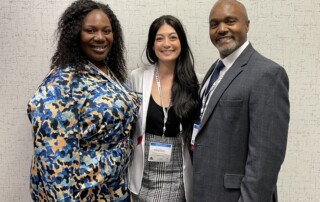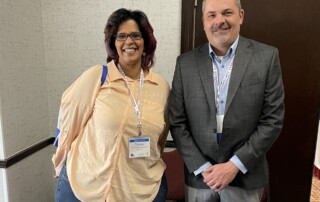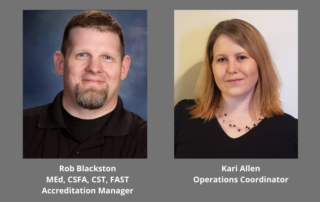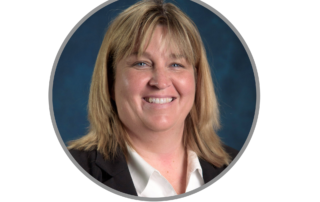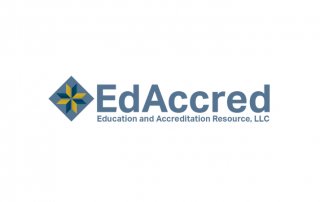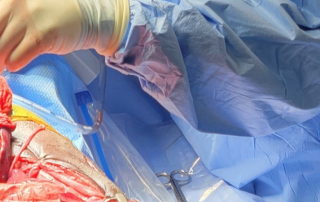Better Together: Recruiting and Retaining Our Students
By Chris Ahearn, AAS, CST Surgical Technology educators from around the country met virtually on February 24 for our third Better Together brainstorming event of 2022. Recruiting and retaining top surgical technology students was on everyone’s mind, and the ideas shared will help shape the future of surgical technology education for the betterment of our students, our programs, and especially [...]
Celebrating All Things SA: National Surgical Assistants Week
The ARC/STSA is honored to join the Association of Surgical Assistants and the National Surgical Assistant Association this week, April 18 -22, 2022, to pay tribute to surgical assistants during National Surgical Assistants Week. Many thanks to each of you for your hard work, long hours and fervent commitment to patient safety. We would also like to express our gratitude [...]
My New Grad Experience at the ASA/NSAA Joint Conference
By Tracey Houston, CSFA, CST The Third Annual Joint Conference of the Association of Surgical Assistants and National Surgical Assistant Association took place on April 1-2 in Las Vegas, Nevada. The conference offered a range of workshops and discussions on emerging trends in the world of surgical assisting, including scientific presentations, multi-station workshops featuring the latest in surgical techniques, and [...]
ARC/STSA’s Golden Jubilee: Celebrating 50 Years of Accreditation and Program Excellence
ARC/STSA is proud to celebrate our golden anniversary this year – 50 years of accreditation and program excellence. Throughout the year, we’ll be looking back at the last five decades — from our humble beginnings in December 1972 as the Joint Review Committee on Educational Programs for the Operating Room Technician (JRC-ORT) to today, as we provide national accreditation services [...]
Join Us in Welcoming Two New ARC/STSA Staff Members!
We are thrilled to announce that two outstanding professionals have joined the ARC/STSA team. Join us in welcoming Accreditation Manager Rob Blackston and Operations Coordinator Kari Allen. Accreditation Manager Rob Blackston, MEd, CSFA, CST, FAST Rob Blackston, MEd, CSFA, CST, FAST, joined the ARC/STSA as its Accreditation Manager on April 1, 2022. Blackston will serve in accreditation services and [...]
Message from the Executive Director: A Deeper Dive into the CCST-7e and new ST Standards, Annual Report Update, and More!
By Ron Kruzel, MA, CAE, CST, ARC/STSA Executive Director Valentine’s greetings from all of us here at the ARC/STSA! Who do we love?! Our surgical technology and surgical assisting educators! So much is happening at the ARC/STSA with the start of 2022. November and December saw CAAHEP approval of the surgical technology Standards and Guidelines, launch of the Core [...]
Looking Inside the Complex Human Heart with zSpace this Valentine’s Day
Featuring Katie Towler, EdS, MA, and Niki Coughlin, BS, RCS, RVS, from Sioux City Career Academy, Sioux City, Iowa. The heart is one of the most complex and vital organs within the human body. However, studying the heart can be challenging because of its intricacy, and not all institutions have access to a cadaver lab and human organs on [...]
You Can Do It…Seeking a Higher Education Degree
By Stephanie Austin, MA, CST, FAST Surgical technology has a long history in the medical community. The education for this profession began as on-the-job training only. As the profession grew, more education was required to hold this position. Beginning this year, in 2022, the official transition to an associate degree has begun. As educators, it is our job to [...]
It’s Valentine’s Day – Share the Love!
ARC/STSA 2022 Scholarships – Share the ! It's Valentine's Day, so why not share the love and spread the word about ARC/STSA's 2022 scholarship opportunities for students and educators! Share this article and encourage your students and fellow educators to apply today for the ARC/STSA 2022 Student and Chris Keegan Memorial Educator Scholarships. Applications are available on the ARC/STSA website’s scholarship page. All completed [...]
The Scrub Life – A Surgical Technology Podcast
By Chris Blevins, BSCJ, AAS-ST, CST, CNA Growth of a Podcast Once upon a time, a girl and her dislike of PowerPoint group presentations decided to venture into the world of podcasting. Who knew that less than four years later, this little project would reach over 8.4K downloads, in three countries, and provide a team project that students look [...]
Better Together: Clinical Success Strategies
Last month, educators’ hearts and minds came together at EdAccred’s first Better Together: Success Strategy Talk of 2022. During the session, “Clinical Success Strategies During the Pandemic,” surgical technology and surgical assisting educators discussed strategies for continued student success in meeting clinical requirements when faced with the current challenges of the pandemic. Take a closer look below at some [...]
AccredX 2022 – Early Bird Pricing Through March 1
Take advantage of the early bird pricing for AccredX, the inaugural accreditation conference and expo presented by ARC/STSA and EdAccred, Thursday, October 6–Saturday, October 8, 2022, in San Antonio, Texas! AccredX will offer hands-on workshops, proven program management strategies, and best practices in surgical technology and surgical assisting education, all designed to support educators in achieving and maintaining compliance [...]
Congrats to Programs Earning Initial and Continuing Accreditation!
ARC/STSA would like to congratulate the surgical technology programs that have recently received awards of initial and continuing accreditation. Please join us in acknowledging the dedication and hard work it took for these programs to reach these critical milestones. Surgical Technology Initial Accreditation: Rasmussen University, Central Pasco – Odessa, FL Pittsburgh Career Institute – Pittsburgh, PA Altierus Career College, Houston [...]
Tell Us How You Celebrate 50 Years
ARC/STSA is celebrating 50 years of excellence in 2022! Throughout this year, we’ll be looking back at the last five decades — from our humble beginnings in December 1972 as the Accreditation Review Committee on Education in Surgical Technology (ARC-ST) to today, as we provide national accreditation services for more than 400 higher education programs in surgical technology and [...]
Message From the Executive Director: Standards and Guidelines Updates, CCST-7e, AccredX and More!
All of us here at the ARC/STSA hope you make the time to relax, enjoy family, friends and rejoice in the holiday season. Before you do, please take a few moments for some end-of-year updates.
A Hands-On Educational Experience With Live Tissues
Meridian Institute of Surgical Assisting, established in 1999, is currently the only accredited surgical assisting program incorporating a porcine live-tissue training lab for students pursuing a career as a surgical first assistant. Originally located in Joelton, Tennessee, the facility moved to Nashville in 2010 to allow more students the opportunity to gain hands-on experience in a laboratory setting.
Be Part of the Self-Care Evolution — Plus, Unwind With ARC/STSA Staff
As we head into the new year, there is no better time than now to think about the self-care of yourself, your team and your students.
‘Tis the Season: Programs Across the Country Give Back
As another challenging year comes to an end, being able to shift our focus to those in need in our communities feels more meaningful than ever during this holiday season. Learn how programs across the country — from California, Nevada and North Carolina — are taking part in community service events in their local areas.
Better Together: Certification Prep Strategies
In late October, educators came together at EdAccred’s third Better Together: Success Strategy Talk. During the session, “Certification Examination Prep Strategies,” surgical technology and surgical assisting educators shared strategies for preparing students for certification examinations and discussed how past test performances can be analyzed to improve scores.
2022 Student and Educator Scholarships Available — Apply by February 18
Applications are now open for the ARC/STSA 2021 Student and Chris Keegan Memorial Educator Scholarships! Learn more about the process and requirements on the ARC/STSA website’s scholarship page. All completed applications must be received by Friday, February 18, 2022.
Congrats to Hillsborough Community College for Receiving Initial Accreditation
ARC/STSA would like to congratulate the surgical technology program at Hillsborough Community College for receiving initial accreditation. Please join us in acknowledging the dedication and hard work it took for this program to reach this milestone.
Message From the Executive Director: Updates on Standards and Guidelines
Despite the cooling weather, it is heating up at the ARC/STSA! Busy is an understatement; many projects are underway and yet there’s so little time … I bet that sounds familiar to you all. With that said and time so precious, let me get right to the latest ARC/STSA updates.
Announcing AccredX 2022 — SAVE THE DATE
ARC/STSA and EdAccred are beyond thrilled to announce their first accreditation expo, AccredX, Thursday, October 6–Saturday, October 8, 2022, in San Antonio, Texas!
A Behind-the-Scenes Look at the Core Curriculum for Surgical Technology, Seventh Edition
ARC/STSA was proud to partner with AST on the development of the “Core Curriculum for Surgical Technology, Seventh Edition” (CCST-7e), set to be released later this fall!
Community Partnerships: The Impact on Learning
In its simplest form, a community partnership is a group of people working toward the same goal. For educators, this goal is to have successful student outcomes.

Surgical Technology Sequencing for Student Success
By Melanie Graves, MBA, CST
In surgery, precision isn’t optional — it’s vital. Every member of the operating room team must be efficient, alert and disciplined. Surgical technologists play a key role in this critical environment, and the way they are trained matters. Our program uses a step-by-step, sequential training approach that gives students the knowledge, skills and confidence to succeed — not just in class, but in the operating room as well. When the teaching method is built around aseptic technique, timely clinical placements and well-integrated observation experiences, it doesn’t just build better techs — it protects patients.
First Semester: Building a Strong Foundation
In our surgical technology program, the first semester is carefully structured to focus on foundational skills, without introducing specialty cases. Students begin by learning the core principles of asepsis — the backbone of surgical safety. At this stage, the curriculum follows a strict sequence. Students progress from understanding what a preference card is to learning how to pull a case, mastering the names of instruments, opening a surgical case, perfecting how to scrub, gown and glove, and preparing a basic exploratory laparotomy.
This approach ensures that students understand not only what to do but why it matters. Aseptic practices aren’t just skills to memorize — they are life-saving measures. Teaching them early and thoroughly helps students develop discipline, attention to detail, and the mindset needed for surgical teamwork.
Observation Clinicals: Bridging the Gap
While mastering these foundational steps, students also attend a weekly observation clinical rotation. These observation days are intentionally placed during the first semester — after core concepts are taught but before hands-on clinicals begin. This timing allows students to see the surgical environment in action, reinforcing what they’re learning in the classroom and lab.
During these observations, students watch surgical teams perform live procedures. They learn how sterile technique is maintained under pressure, how team members communicate, and how the flow of a surgery unfolds in real time. Just as important, they see where to stand, learn when to speak and how to respect and preserve the sterile field.
This early exposure shapes their understanding of the OR, ignites curiosity and builds motivation. When they return to the lab, they bring better questions and sharper focus, connecting classroom knowledge to real-world practice.
Clinical Readiness Exam: The Gatekeeper to Clinical Practice
Before students can begin their hands-on clinical rotations, they must pass a comprehensive final hands-on skills assessment called the Clinical Readiness Exam. This exam is designed to ensure that students have mastered essential competencies: setting up sterile fields, identifying instruments, maintaining asepsis, and demonstrating confidence in the basic sequence of surgical case preparation.
This high standard protects both students and patients. Clinical sites expect students to be capable, prepared and safe. Requiring mastery before placement ensures that students enter the OR as contributors, not as liabilities.
Specialty Cases Come After the Basics
Only after passing the Clinical Readiness Exam do students transition into their clinical rotations, where the focus shifts to specialty surgeries. This timing is intentional. By this stage, students are no longer in the learning phase of how to handle instruments or keep a sterile field — they’ve already mastered those skills. Now, they can focus on learning the nuances of various specialties such as orthopedics, neurology, gynecology and more.
This sequence allows students to absorb complex information in context. They’re not distracted by basic technique or overwhelmed by unfamiliar environments. Instead, they’re ready to adapt, assist and grow into the role of surgical technologist with confidence and clarity.
Structured Training, Stronger Technologists
When surgical technology is taught in a well-ordered, sequential format — grounded in aseptic principles, supported by observation clinicals and timed appropriately for hands-on practice — the results speak for themselves. Students gain more than technical ability. They learn to think critically, act decisively and uphold the safety of the surgical field with integrity.
They understand the “why” behind every step, understand the connection to the “how”, and they’re equipped to support the surgical team from day one. From their first semester to their final rotation, they develop into professionals who are prepared, capable and committed to patient care.
Conclusion
Surgical technology is a discipline where preparation, precision and patient protection intersect. Teaching it in sequential order — with aseptic technique as the foundation, early observation as reinforcement, and clinical placements timed after demonstrated readiness — transforms students into professionals. In our program, students learn the basics first, master their skills in the lab, and only then enter the clinical field to explore specialty surgeries. This structure produces not only skilled technologists but also thoughtful, reliable team members who understand their vital role in safeguarding patient lives.
Melanie Graves, MBA, CST, is the Program Director and Department Chair of Surgical Technology at Austin Community College in Austin, TX. She graduated from the same program in December 2015 and scrubbed in Austin and Cedar Park until 2022. In January of 2020, she began teaching for ACC’s Surgical Technology program alongside those who taught her, and she moved into her role as the Program Director in August of 2023.


